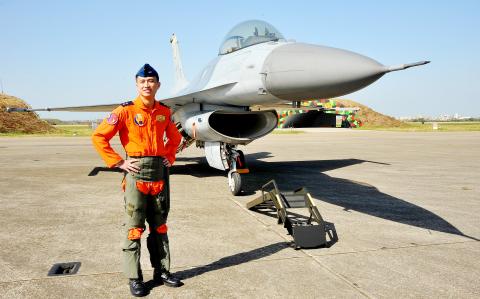US-based media reported on Thursday that the US government had privately decided to sell a new arms package to Taiwan, but was keeping it under wraps until after an official delegation by Chinese President Hu Jintao (胡錦濤) visits next week.
Quoting unnamed senior US government officials, the Washington Times said the package would include new upgrades for Taiwan’s aging arsenal of US-made F-16A/Bs and it is expected to trigger fresh outrage from Beijing.
In Taiwan, the Ministry of National Defense and the Air Force would neither confirm nor deny the information, with officials saying they had yet to learn of the content of the reports.

PHOTO: LIU HSIN-DE, TAIPEI TIMES
In recent years, Taiwan has made repeated requests for purchases of F-16C/D aircraft from the US, saying the fighters were necessary to ensure balance in the Taiwan Strait following reports of China’s development and testing of fourth and fifth-generation fighter aircraft, including the Chengdu J-20 stealth fighter.
The prototype plane — China’s first radar-eluding stealth fighter, seen as match for the US’ F-22 — reportedly made its first test flight on Wednesday. Experts said that when operational, the fighter would likely overwhelm Taiwanese defense capabilities.
The Washington Times reported that while Taiwan’s request for F-16C/Ds was still being considered, the upgrade package, which would provide the existing fleet with new electronics, engines and missiles, had already been secured.
Other elements of the arms package could include new radar, possibly the advanced Active Electronically Scanned Array system and AIM-9X air-to-air missiles, the report said.
Time is running short for the new F-16 request. US lawmakers who support their inclusion have said that F-16 production lines are expected to close soon, possibly later this year, and are unlikely to be reopened.
The news comes at a sensitive time for US-China relations, with Hu expected to meet US President Barack Obama at the White House on Wednesday. Beijing cut military exchanges after a previous arms deal last year and imposed sanctions on US firms involved in the deal.
One of the aims of US Secretary of Defense Robert Gates’ three-day visit to Beijing earlier this week was to reactivate military exchanges between the US and China.
At a joint press conference on Monday, Chinese Defense Minister Liang Guanglie (梁光烈) said the US should halt future arms sales to Taiwan, as they “jeopardized China’s core interests.”
Reports said Gates later told reporters he did not believe the US’ arms sales policy toward Taiwan would change anytime soon.
Chinese Nationalist Party (KMT) Legislator Lin Yu-fang (林郁方), a member of the legislature’s Foreign and National Defense Committee, said that based on recent meetings with US government officials, the upgrade package for the F-16s could materialize “soon,” adding that the deal was likelier to materialize than the sale of new F-16C/Ds.
Under the US’ Taiwan Relations Act, the US is obliged to provide Taiwan with defensive weapons, although sales of major hardware, including fighter aircraft, have become less frequent in recent years.
Most of Taiwan’s arsenal of Air Force fighters other than the F-16A/Bs could be retired by 2025, with F-5E/Fs scheduled to be decommissioned between 2014 and 2017.

FALSE DOCUMENTS? Actor William Liao said he was ‘voluntarily cooperating’ with police after a suspect was accused of helping to produce false medical certificates Police yesterday questioned at least six entertainers amid allegations of evasion of compulsory military service, with Lee Chuan (李銓), a member of boy band Choc7 (超克7), and actor Daniel Chen (陳大天) among those summoned. The New Taipei City District Prosecutors’ Office in January launched an investigation into a group that was allegedly helping men dodge compulsory military service using falsified medical documents. Actor Darren Wang (王大陸) has been accused of being one of the group’s clients. As the investigation expanded, investigators at New Taipei City’s Yonghe Precinct said that other entertainers commissioned the group to obtain false documents. The main suspect, a man surnamed

DEMOGRAPHICS: Robotics is the most promising answer to looming labor woes, the long-term care system and national contingency response, an official said Taiwan is to launch a five-year plan to boost the robotics industry in a bid to address labor shortages stemming from a declining and aging population, the Executive Yuan said yesterday. The government approved the initiative, dubbed the Smart Robotics Industry Promotion Plan, via executive order, senior officials told a post-Cabinet meeting news conference in Taipei. Taiwan’s population decline would strain the economy and the nation’s ability to care for vulnerable and elderly people, said Peter Hong (洪樂文), who heads the National Science and Technology Council’s (NSTC) Department of Engineering and Technologies. Projections show that the proportion of Taiwanese 65 or older would

The government is considering polices to increase rental subsidies for people living in social housing who get married and have children, Premier Cho Jung-tai (卓榮泰) said yesterday. During an interview with the Plain Law Movement (法律白話文) podcast, Cho said that housing prices cannot be brought down overnight without affecting banks and mortgages. Therefore, the government is focusing on providing more aid for young people by taking 3 to 5 percent of urban renewal projects and zone expropriations and using that land for social housing, he said. Single people living in social housing who get married and become parents could obtain 50 percent more

Democracies must remain united in the face of a shifting geopolitical landscape, former president Tsai Ing-wen (蔡英文) told the Copenhagen Democracy Summit on Tuesday, while emphasizing the importance of Taiwan’s security to the world. “Taiwan’s security is essential to regional stability and to defending democratic values amid mounting authoritarianism,” Tsai said at the annual forum in the Danish capital. Noting a “new geopolitical landscape” in which global trade and security face “uncertainty and unpredictability,” Tsai said that democracies must remain united and be more committed to building up resilience together in the face of challenges. Resilience “allows us to absorb shocks, adapt under